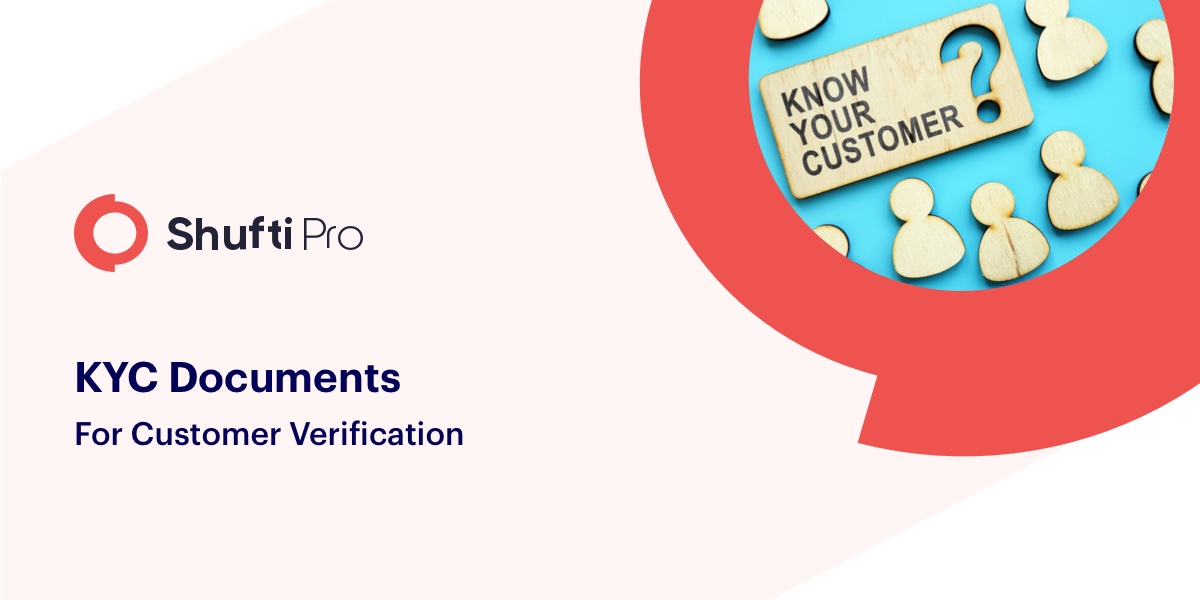Which KYC Documents are Required for Customer Verification?

Name, Rank, Brigade, and Serial Number. That’s the only information military organizations across the globe use to identify their members. Unfortunately, financial institutes can’t use the same simplicity for the identification of customers and businesses. Owing to the increasing number of fraudulent activities, financial firms must follow stringent regulatory laws when onboarding customers or doing business with counterparties.
What is Know Your Customer?
Know Your Customer or KYC is a commonly used term in the banking sector and refers to the process of clients’ identity verification when indulging in business with them. Banks, digital payment service providers, or financial firms are required by banking norms to have customer’s KYC process completed before allowing them complete access to all services.
KYC verification process is deemed necessary to mitigate illegal activities such as money laundering, bribery, or corruption. It assists authorities and businesses to keep track of customer activity and detect fraudsters beforehand. Apart from a legal perspective, performing KYC also helps companies to keep fraudsters out of their systems.
Why is KYC important?
KYC helps bankers to ensure that the application and other identity details provided by the client are real. Owing to instances like money laundering and siphoning money off from bank accounts, verifying the identity of an individual is essential to prevent fraud.
KYC has been in practice for many years now and all customers have to comply with KYC regulations. Without KYC compliance, it is not possible to open a bank account.
However, banks have been practicing manual KYC, which requires a lot of human effort as well as time. Additionally, the risk of human error is always there involved. Error in such processes could lead to a great financial loss to the institute. Banks need to adopt a better approach to KYC verification.
A better way
To enhance the KYC verification process, the financial sector should employ a digital system that could reduce the time required for verification and manual labor. Based on the principles of automation, digital KYC can reduce cost and human effort, while increasing accuracy. The manual process that could take hours and even days can be cut down to seconds by utilizing AI-based verification solutions.
By employing automated systems, businesses can onboard, secure clientele that too in real-time. The tiresome procedure of manual onboarding sometimes results in losing customers.
Moreover, digital KYC not only helps in identification, but it could also filter and sort customers based on the risks involved with specific individuals or entities. Businesses and banks can remain vigilant and perform ongoing monitoring for high-risk individuals. Also, due to globalization, real-time onboarding and verification are considered a basic requirement.
How is Digital KYC performed?
Same way as the manual KYC, the digital verification process involves the collection and verification of user information. However, the process is performed digitally and doesn’t require a user to be physically present at the time of verification.
Digital KYC Verification Process
While manual verification demands the user to fill out long forms and attach documents, the digital KYC just requires the user to upload a picture of a valid identity document.
The information from the document is automatically extracted using Optical Character Recognition (OCR) technology. This extracted data is sent to an artificial intelligence-powered system, which analyzes the information and verifies if the information is correct or not. Some cutting edge systems such as Shufti’s, even synergize artificial and human intelligence to further improve the accuracy and deliver perfect results.
Find more resoures on KYC.
Which KYC Documents are Accepted and What Information is Analyzed?
The documents required for verification vary, depending on the regulatory requirements of a country, however, some generic documents are acceptable in almost every country.
KYC Documents for Individual Identification and Address Verification
For identification and verification of individuals, the acceptable documents include:
- Government-Issued Photo-based Identity Card
- Passport
- Passport Card
- Driver’s License
- Debit/Credit Cards
For proof of address, if it’s not mentioned on the above-stated documents the following are acceptable for address verification:
- Utility Bills
- Bank Statment
- Rent Agreement
- Employer Letter
- Insurance Agreement
- Tax Bills
However, the documents must not be more than 3 months old.
All of the above KYC documents can be used to collect the needed data. The data that most countries and jurisdictions require for verification is:
- Full Name
- Document Number
- Address of Residence (For Address Verification)
- Image of the Person
- Date of Birth (Mostly needed for Age Verification)
- Document Issue and Expiry Date
- Nationality
To verify that the uploaded document is original and contains the required information, an AI-based document verification system checks for the originality of the document as well.
Conclusion
To sum things up, the KYC verification process is essential for banks and financial institutes and using digital verification for KYC is necessary to demit frauds and scams. Furthermore, it will increase security, ensure accuracy, and most importantly enhance customer experience.

 Explore Now
Explore Now













